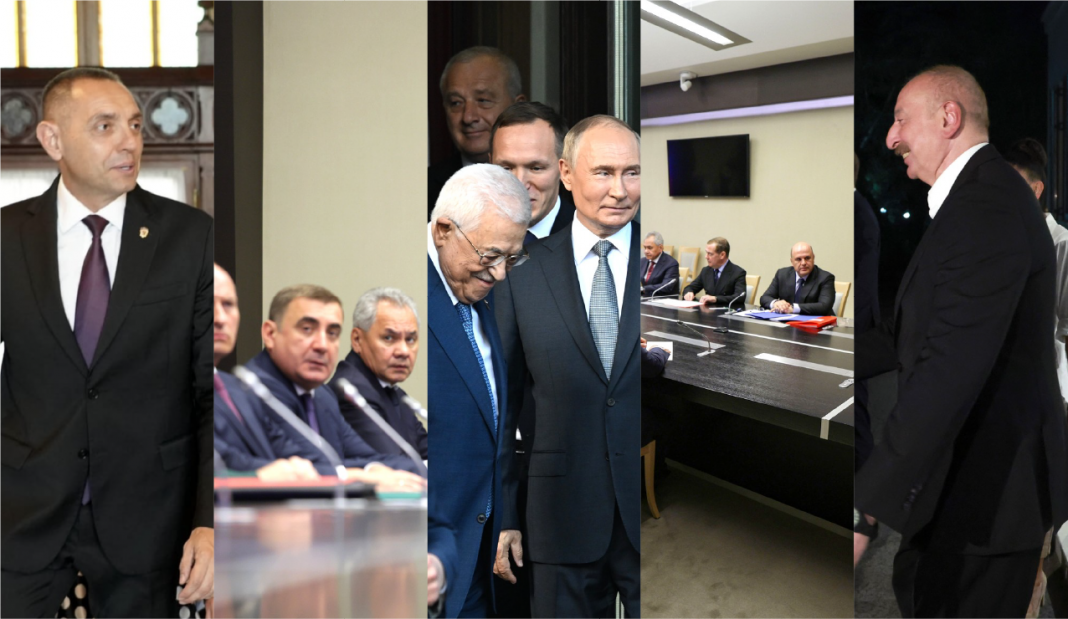This report presents key events that had an important impact on political, economic and social processes within Russia.
According to the results of the past week the following tendencies can be defined in the following theses:
- Putin has increasingly demonstrated that Russia sides with Palestine in the Israeli-Palestinian conflict. This originally stemmed from the “Primakov Doctrine,” of which Yuri Ushakov, an aide to the Russian president, is a follower and adherent. The doctrine anticipates maximum reliance on the Arab factor in the Middle East. Russia has consistently demanded that Israel comply with a UN Security Council resolution that emphasizes the need for a Palestinian state, but the resolution is ignored by Israel, which for decades has relied on U.S. support.
- Uzbekistan is gradually turning into Russia’s main ally in Central Asia. This is causing serious irritation to neighboring states, primarily Kazakhstan and, to a lesser extent, China. But Uzbekistan is extremely important to Putin strategically (as he constantly emphasizes), and Russia is important to Uzbekistan itself – including for promoting its interests beyond the region.
- Over the past two years, Putin has been demonstratively developing relations with Azerbaijan, which is not a member of the CSTO (unlike Armenia). But at the same time Putin makes it clear that interaction in oil and gas, logistics and other spheres with Baku, not Yerevan, gives him great advantages. The CSTO is essentially a dead structure, and Russia needs living forms. Contacts with Baku simultaneously serve to strengthen relations between Moscow and Ankara: Azerbaijan is Turkiye’s political satellite and partner.
This digest looks at the following issues that were most relevant to Russia between August 12th and 18th:
- Vladimir Putin’s operative meeting on the situation in Russia’s regions bordering Ukraine;
- Russian-Palestinian talks;
- A telephone conversation between Vladimir Putin and Uzbek President Shavkat Mirziyoyev;
- Meeting with the permanent members of the Security Council;
- Vladimir Putin’s visit to Azerbaijan;
- Serbian Deputy Prime Minister Aleksandar Vulin’s visit to Moscow.
This Content Is Only For Subscribers
- Vladimir Putin’s operative meeting on the situation in Russian regions bordering Ukraine
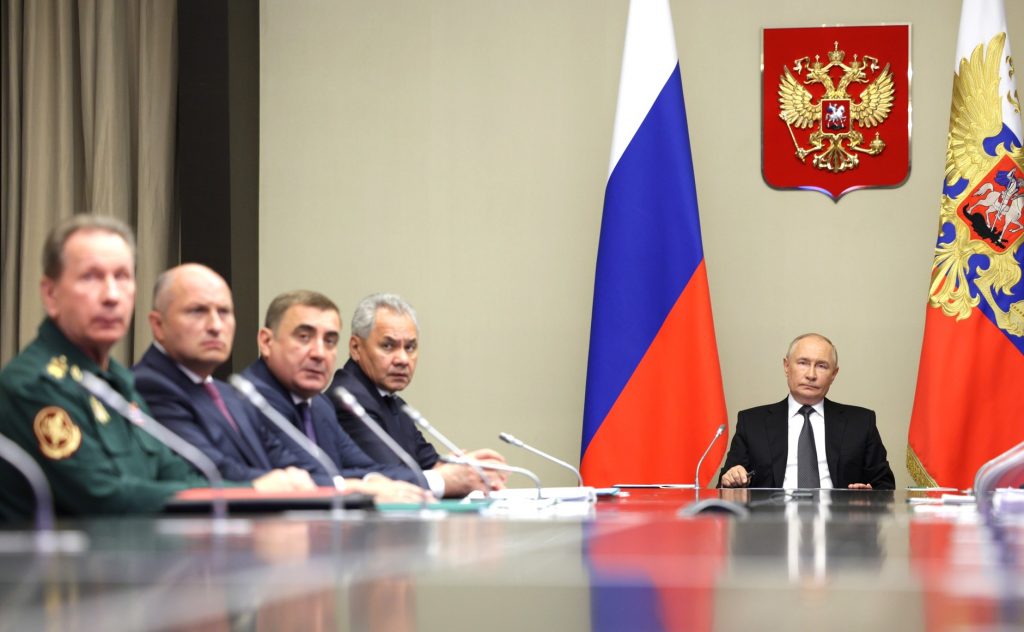
On Monday, August 12, Vladimir Putin held an operational meeting with members of the Security Council, the Government, representatives of the Presidential Administration, heads of security agencies, as well as heads of Belgorod, Bryansk and Kursk regions. The main topic of the meeting was the situation in Russia’s Kursk Region, as well as attempts to expand the invasion zone of the Ukrainian Armed Forces to other border regions.
Key Abstracts:
- Putin: “An assessment of the current events must, of course, be made, and this will be done. But the main thing now is to solve the actual tasks that are taking shape at this moment in time and on the basis of forecasts of how the situation will develop. The main task is undoubtedly facing the Ministry of Defense: to push the enemy out of our territories and, together with the Border Guard Service, to ensure reliable coverage of the state border”.
- Putin: “To all appearances – the enemy, with the help of its Western masters, is doing their will, and the West is fighting us with the hands of Ukrainians – so, to all appearances, the enemy is seeking to improve its negotiating positions in the future. But what kind of negotiations can we even talk about with people who indiscriminately strike civilians, civilian infrastructure, or try to threaten nuclear power facilities? What is there to talk about with them?”.
- Putin: “Such actions, of course, pursue the main military goal, namely to stop the offensive of our troops to completely liberate the territories of the Luhansk and Donetsk People’s Republics and the territory of Novorossiya. And what? What is happening at the line of contact, what are the results? The pace of offensive operations by the Russian Armed Forces, volunteers and veterans has not only not decreased, but on the contrary, it has increased, increased by one and a half times. Our armed forces are advancing along the entire line of contact.
- Putin: “And finally, another of the enemy’s obvious goals is to sow discord and discord in our society, to intimidate people, to destroy the unity and cohesion of Russian society, that is, to strike a blow at the domestic political situation. But even here the response from the citizens of Russia is already in place – it is unanimous support for all those who are in trouble, support for the army and an increase, which is very important, an increase in the number of those willing to join our men, the fighters who heroically defend Russia with weapons in their hands. The number of those willing to sign contracts with the Ministry of Defense has increased in recent days.”
- Putin: “The leaders of the Kyiv regime are not only committing crimes against the Russian people, but, in fact, have embarked on the path of exterminating the Ukrainians themselves, the Ukrainian people, who, apparently, no longer consider themselves their own. The losses of the Ukrainian armed forces are dramatically increasing for them, including among the most combat-ready units and subunits that the enemy is moving to our border”.
- Alexander Bogomaz (Governor of Bryansk Oblast): “We have today a stable situation on the territory of the Bryansk region, we can say, the same as it was a month ago. We can see by the number of shellings, it is in principle constant, that is, within the range of 80-90 shellings per week. But I would like to note that recently we see that they have started shelling civilians more and more. If we take even just the previous day, the ninth: out of 22 shellings, 11 were on civilians, on the population that lives there, on houses, on cars, on buses. We are reimbursing all the damage from the regional budget.
- Vyacheslav Gladkov (Governor of Belgorod Region): “We have recently improved the situation only in the city of Belgorod, compared to the first quarter of 2024 there were only two missile attacks on Belgorod with cluster munitions. In general, the situation along the border region has deteriorated sharply, and the number of shelling by artillery, mortars, MLRS has increased dramatically, as well as the number of drone attacks has multiplied.
- Gladkov: “Today’s situation in Krasnaya Yaruga, I hope that cooperation between all security agencies, primarily the Ministry of Defense and the Border Guards will resolve the current situation that arose in the morning, and tomorrow, I hope that we will return people to their places of residence, with the exception of three settlements, primarily Kolotilovka, which is not yet inhabited, but is actually under constant fire, and we will make a decision on its resettlement with the provision of housing. There is such an opportunity within the limits of earlier decisions taken by the Government of the Russian Federation and your decision, dear Vladimir Vladimirovich,” he said.
- Manturov: “As for Kursk Region, we are in daily contact. Reports are received from all the agencies that have formed their headquarters, first of all it concerns the federal emergency, it is the Ministry of Emergency Situations. All work is being done to evacuate the population to temporary accommodation centers. Vladimir Vladimirovich, all other issues are under control, we are working with the region promptly. Thank you.
- Manturov: “Regarding the Belgorod region. I can say that a decision has been made, supported by you, in Kursk regarding the moratorium on mortgage payments and consumer loans. All the banks have already taken it to work. This applies to Sber, VTB, and all other banking institutions that have been providing loans to residents of Kursk region. We will also promptly work on the Belgorod region”.
- Khusnullin: “We will prepare this decision, it is absolutely fair, it should be immediately extended to Belgorod, Kursk, and potentially Bryansk, if such cases arise. Denis Valentinovich and I will work out the relevant decisions here and report to you”.
- Alexei Smirnov (Governor of Kursk region): “At present the situation in the region is difficult, as of today 28 settlements are under the control of the enemy. The depth of penetration into the territory of Kursk region is 12 kilometers, the width along the front is 40 kilometers”.
- Putin: “Look, Alexei Borisovich, this military department will report to us on how wide and deep it is. You will tell us about the socio-economic situation and report on assistance to people.
- Smirnov: “At present, we have started to fulfill the task of the Ministry of Defense to build 90 platoon support points, where 350 units of equipment are involved and up to 5 thousand construction workers are involved. We are in constant cooperation with First Deputy Prime Minister Manturov Denis Valentinovich, Khusnullin Marat Shakirzyanovich, the Ministry of Construction and the Ministry of Transportation. In addition, we have dug 40 kilometers of anti-tank ditch out of the planned 46, we are finishing the work. We have also started placing 40 checkpoints. The KTO regime was introduced from 23 hours on August 9 this year. We are working with the Federal Security Service of Russia and the IAB.
Totals/Predictions:
The meeting itself is an absolutely understandable and predictable action in the current situation. However, the fact that such events are held on camera” and not in closed mode, as required by military-strategic tasks, shows that Putin decided to create a television “picture” around the meeting itself in order to show citizens that the leadership understands the seriousness of the situation and is solving issues, not only in the military part, but also in the social part, showing concern for ordinary citizens. The main message in this case is that “everything is under control” and “we have our finger on the pulse of the situation.
- Russian-Palestinian negotiations
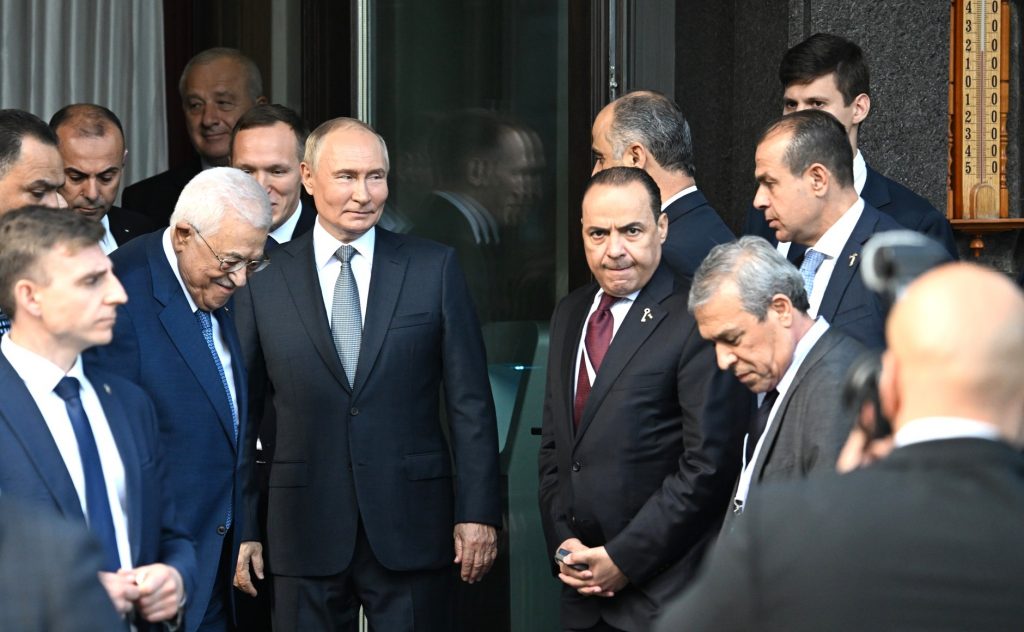
On Tuesday, August 13, Palestinian President Mahmut Abass arrived in Russia on an official visit. On the same day, his talks with Vladimir Putin were held at the Russian President’s residence Novo-Ogaryovo. Members of the delegations also took part in the talks. On the Russian side, the delegation was represented by Foreign Minister Sergei Lavrov, Presidential Aide Yuri Ushakov, Minister of Labor and Social Protection Anton Kotyakov, Head of the Main Directorate of the General Staff of the Armed Forces Igor Kostyukov, as well as the representative of the Russian Federation to the Palestinian National Authority Gocha Buachidze.
On the Palestinian side, the delegation was represented by Hussein Al-Sheikh, Minister of Civil Affairs, Majed Ferej, head of the General Intelligence Service, Abdelhafiz Nofal, Ambassador Extraordinary and Plenipotentiary of the State of Palestine to the Russian Federation, and Majdi Khaldi, Diplomatic Advisor to the President of the State of Palestine.
Key Abstracts:
- Putin: “First of all, let me welcome you cordially to Moscow. We have not seen each other for two years, although we are in constant contact, and I am very happy to see you – you and your delegation.
- Putin: “It is well known to everyone that Russia today, unfortunately, must defend its interests, defend its people with weapons in its hands. But what is happening in the Middle East, what is happening in Palestine, certainly does not go unnoticed by us. We have very long-standing deep ties with the Arab world in general, with Palestine in particular, and we value this very much”.
- Putin: “And of course, we are watching with great pain and concern the humanitarian catastrophe that has unfolded in Palestine. For our part, we are doing everything we can to support the Palestinian people. You know, we have sent about 700 tons of cargo of various kinds, and we are doing everything we can to use every opportunity to support the Palestinians and the Palestinian people. First of all, of course, we are worried about the losses among the civilian population. According to the UN, it is already 40 thousand people, and mostly, mainly women and children”.
- Putin: “You know that we have always advocated a peaceful settlement and we understand that we have a common position, and it is that the roots of this problem go back a long way and are connected primarily with ignoring the decisions taken earlier at the level of international organizations, primarily at the level of the United Nations, with the formation and establishment of an independent Palestinian state. Our position here is unchanged. It was formulated a long time ago and is not of any opportunistic nature. We believe that in order to ensure a long-lasting, reliable and stable peace in the region, it is necessary to implement all the decisions of the United Nations and, above all, to establish a full-fledged Palestinian state”.
- Abbas: “I am very happy to be here in Moscow. This is indeed a friendly country for the Palestinian people. This friendship has linked us for decades – between the Palestinian people, the Soviet Union, the Russian Federation. All this time, all these decades, we have always felt the support, the fact that Russia at the level of the government and the people stands by the Palestinians.”
- Abbas: “Russia always stands on the side of law, on the side of truth. And every time I talked to Mr. President about international law, those resolutions that were adopted – they really started in 1947, since then more than 1,000 decisions, resolutions have been adopted in the General Assembly, in the Security Council. But nevertheless the UN because of American behavior, pressure from the US has failed in its mission to give one decision, that to pass one resolution that would realize and ensure the realization of the right of the Palestinian people.”
- Abbas: “I know that you are concerned, following what is happening. We are always consulting with you, we are always in contact at the level of foreign ministries, at the level of ambassadors. We are always in touch, we always feel the warmth of our relations with the Russian Federation and the great attention and importance that our friends and brothers in Russia attach to our problem, to the suffering that we are enduring today in the context of the humanitarian situation, in the context of security. And for our part, we also stand, without a doubt, on the side of the Russian Federation”.
- Abbas: “We continue our struggle, patiently endure all the hardships and count, of course, on humanitarian support for the Palestinians, an end to the policy of expatriation. We will not accept this, we will not accept the expatriation of Palestinians from the Gaza Strip, from the West Bank, from Jerusalem, as it happened before repeatedly, in the 20th century: in 1948, in 1967. And we believe that with your support we will achieve our goals.”
Totals/Predictions:
Putin has increasingly demonstrated that Russia sides with Palestine in the Israeli-Palestinian conflict. This originally stemmed from the “Primakov Doctrine,” of which Yuri Ushakov, an aide to the Russian president, is a follower and adherent. The doctrine anticipates maximum reliance on the Arab factor in the Middle East. Russia has constantly demanded that Israel comply with the UN Security Council resolution that emphasizes the need for a Palestinian state, but the resolution is ignored by Israel, which for decades has relied on U.S. support. Now the support from Washington is not so obvious and Russia is trying to show its support for the Palestinian position again. This is definitely not to Israel’s liking and is exacerbating the conflict situation in the Middle East. From the very beginning of the hostilities, Russia has emphasized that it is on the side of Palestine, and Mahmoud Abbas’ visit to Moscow is yet another confirmation of this.
- Telephone conversation between Vladimir Putin and Uzbek President Shavkat Mirziyoyev
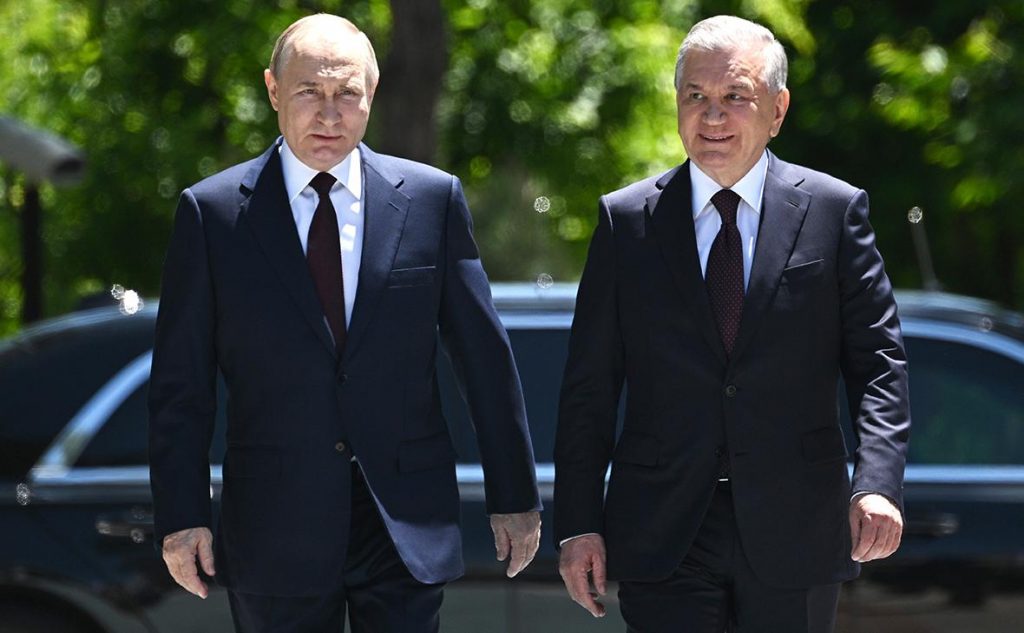
A telephone conversation between Vladimir Putin and Uzbek President Shavkat Mirziyoyev took place on Thursday, August 15, at the initiative of the Uzbek side. According to the official reports of the parties, during the conversation they discussed issues of dynamically developing bilateral cooperation in various areas. The sides also discussed topical issues on the international and regional agenda, including in view of Russia’s current chairmanship in BRICS.
Totals/Predictions:
Uzbekistan is gradually turning into Russia’s main ally in Central Asia. This is causing serious irritation to neighboring states, primarily Kazakhstan and, to a lesser extent, China. But Uzbekistan is extremely important to Putin strategically (as he constantly emphasizes), and Russia is important to Uzbekistan itself – including for promoting its interests beyond the region. Among other things, Uzbekistan is the fastest growing economy in Central Asia. Rapid population growth is leading to an outflow of labor force – mainly to Russia. Uzbekistan and Russia have many positions that require constant contact between the two leaders. Especially given Uzbekistan’s interest in BRICS integration.
- Meeting with the permanent members of the Security Council
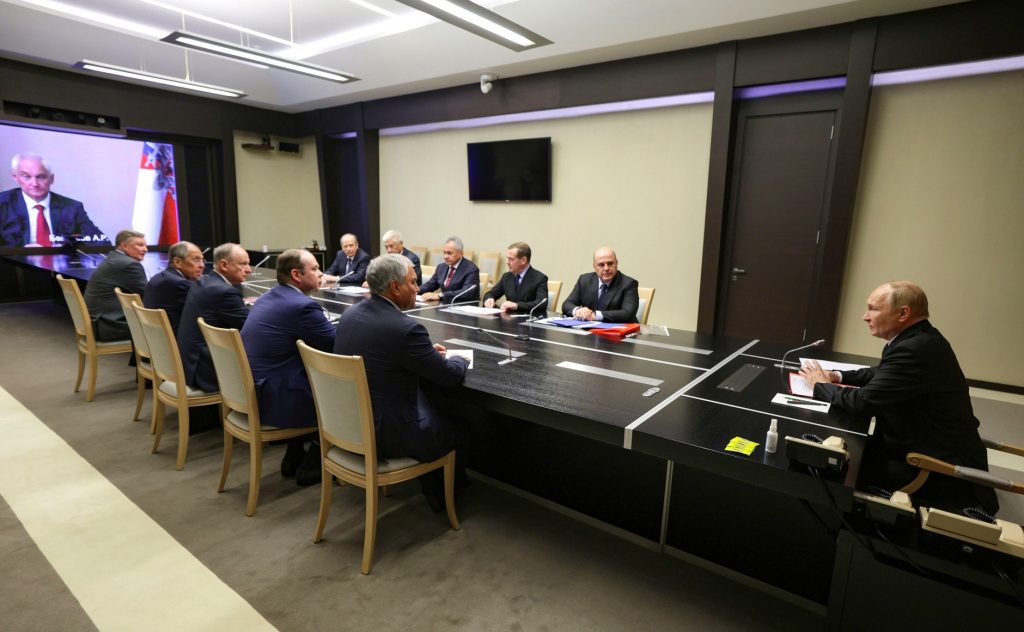
On Friday, August 16, Vladimir Putin held a traditional meeting with permanent members of the Security Council. It is noteworthy that, like last time, the meeting was held in an offline format. At the same time, the main speaker – Defense Minister Andrei Belousov – took part in the meeting via video link because he was “at one of the control points”.
It is noted that the main topic of the meeting was new technical solutions used during the Russian aggression against Ukraine.
The meeting was attended by Prime Minister Mikhail Mishustin, State Duma Chairman Vyacheslav Volodin, Deputy Chairman of the Security Council Dmitry Medvedev, Head of the Presidential Administration Anton Vaino, Secretary of the Security Council Sergei Shoigu, Presidential Aide Nikolai Patrushev, Minister of Defense Andrei Belousov, Minister of Internal Affairs Vladimir Kolokoltsev, Minister of Foreign Affairs Sergei Lavrov, Director of the Federal Security Service Alexander Bortnikov, Special Presidential Envoy for
Totals/Predictions:
Putin is trying to show that weekly meetings of the Security Council have become a normal practice and that it is in the Security Council that the main center of the country’s governance is gradually concentrated. In fact, we are talking about a kind of a new “politburo”. And it is absolutely unimportant what problems and issues are discussed at a regular meeting. It is important that the control center works, collective decision-making, teamwork, and the role of the leader is emphasized.
- Vladimir Putin’s visit to Azerbaijan
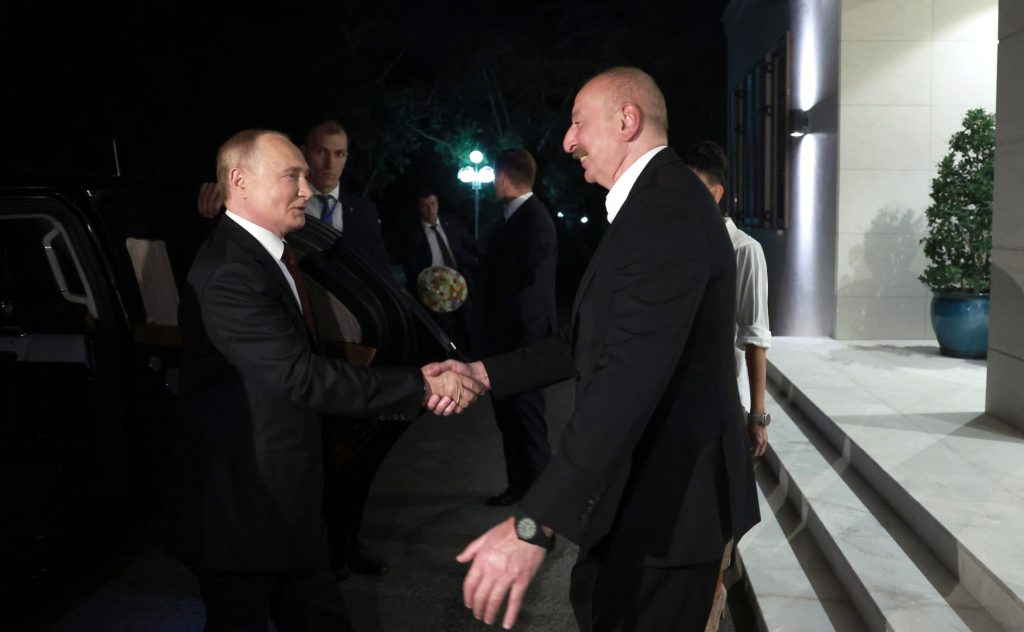
On Sunday, August 18, Vladimir Putin’s planned two-day state visit to Azerbaijan began. It is worth noting that this visit was the first one during the full-scale Russian aggression against Ukraine.
According to official information, during the visit the sides plan to discuss issues of further development of Russian-Azerbaijani relations of strategic partnership and alliance, as well as topical international and regional problems. Following the visit, it is planned to adopt a joint statement by the heads of state, sign intergovernmental and other documents.
Immediately upon his arrival in Azerbaijan, the Russian President met with President of the Republic of Azerbaijan Ilham Aliyev and his spouse, First Vice President of the Republic of Azerbaijan Mehriban Aliyeva. The parties had an informal lunch, which took place at the Azerbaijani leader’s residence on the Caspian Sea shore.
Totals/Predictions:
Over the past two years, Putin has been demonstratively developing relations with Azerbaijan, which is not a member of the CSTO (unlike Armenia). But at the same time Putin makes it clear that interaction in oil and gas, logistics and other spheres with Baku, not Yerevan, gives him great advantages. The CSTO is essentially a dead structure, and Russia needs living forms. Contacts with Baku simultaneously serve to strengthen relations between Moscow and Ankara: Azerbaijan is a political satellite and partner of Turkiye. In this respect, Putin is trying to strengthen the predictability of two regions at once – the Caucasus and the Caspian.
- Serbian Deputy Prime Minister Aleksandar Vulin’s visit to Moscow
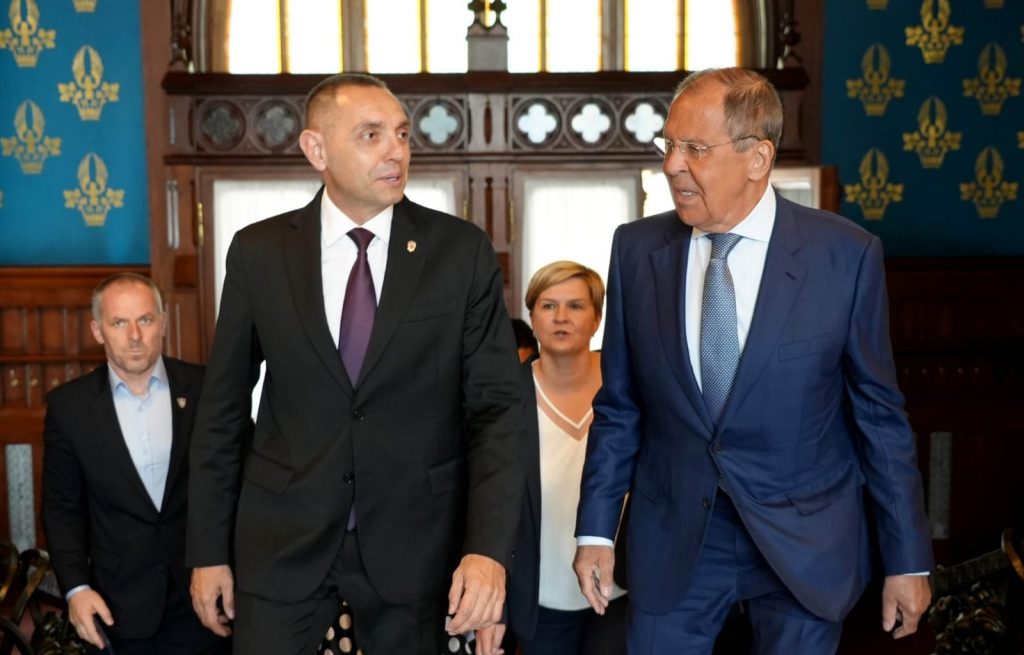
On Tuesday, August 13, Serbian Deputy Prime Minister Aleksandar Vulin arrived in Moscow on a working visit, where he held a number of bilateral meetings. Among other things, Vulin held official talks with Russian Foreign Minister Sergey Lavrov. In addition, the Serbian politician, who has been under US sanctions since last year, gave an interview to the RIA Novosti news agency, in which he spoke about the need to strengthen bilateral relations between Moscow and Belgrade, as well as stated about the upcoming escalation of internal political processes in Serbia by the West.
Key talking points from Woolin’s interview:
- “Conflict can be avoided if Russia is strong enough to make it clear to everyone that it cannot be defeated. Europe behaves like a group of territories, not a union of states, and does not take into account its own interests – economic, in security and no other. It did not take care of itself and in the migration crisis, when it accepted millions of migrants, now it does not know what to do with them, they have completely changed its structure. And now Europe is sliding into a conflict with the Russian Federation, which is not caused by anything, Russia does not threaten Europe in any way”.
- “Before every world war there is some kind of phobia – then it was Serbophobia, before World War II it was Judeophobia, now it is Russophobia, any evil towards Russians is allowed and any lie is acceptable. And talking about peace is treason. And this alarms me. I am proud that Serbia, thanks to President Aleksandar Vucic, has not become part of Russophobia and anti-Russian hysteria. Russophobia has always ended in Serbophobia. No one who hates Russia loves Serbia. That is why I am greatly concerned and see that Europe is sliding towards war, that those who call for peace are called traitors, conservatives, often fascists. This is not the case in Serbia, but in Europe, I’m afraid it is.”
- “We are heading towards a conflict of civilizations, in which on one side are the values: God, nation, family. On the other side, there is a world without God, without nation, so everyone must be part of one global consumer state, and there is no family, the concept of LGBT+ (the LGBT movement is recognized as extremist and banned in the Russian Federation) abolishes the family”.
- “The popularity of President Putin and Russia in Western Europe is not due to the fact that there are millions of Germans who suddenly fell in love with Russians, they never loved them, neither in World War I, nor in World War II, nor afterward. But they see values in the Russian Federation that they support, they want to live with their God, nation and family. And they are being imposed on a society that doesn’t have that. And that is the reason.”
- “They say that the Russian Federation with its malign influence created parties there – not a single one. It is the West that creates parties and NGOs. But the system of values that dominates in Russia is the one that many millions of people perceive as their system of values, and so realize themselves. This is the essence of the conflict.
- “If Europe was behaving as a union of states rather than territories, it should have raised the question earlier – what happened to Nord Stream? What happened there? The German economy was very badly hurt by it, and with it the whole of Europe, because the FRG is its motor. But there is still no investigation completed, the only thing that has been established is that it is not known how it happened.”
- “Peace in Ukraine could have been achieved back at the talks in Istanbul, at the very beginning of the [so-called] “SWO”. But this did not happen, because the decision about peace in Ukraine is made by countries and politicians not from Ukraine, who want to fight Russia to the last Ukrainian. Every such operation, attack like this only continues the conflict and distances peace.”
- “When there was an assassination attempt on Mr. Fitzo and then on Trump, I told President Vucic to prepare. Because something happens to everyone who is in favor of a peaceful solution on Ukraine, someone shoots at them. There are too many accidents, don’t forget the Iranian president and the foreign minister who died under strange circumstances. Aleksandar Vucic is a man whose life is threatened by those who would like Serbia to stop being militarily neutral, impose sanctions against Russia, recognize Kosovo’s independence and give up the Republika Srpska in Bosnia and Herzegovina (RS BiH).”
- “Vucic is also under threat from the drug clans we have uncovered, whose members are on the run. Such large organized crime groups never arise without the support of powerful intelligence services. They should have served for direct execution, but those who are hindered by Aleksandar Vucic are in political circles. Such Serbia is hindered by Vucic because he unites patriotic forces, and without his authority Serbia would not have survived not to impose sanctions against Russia.”
- “I do not believe in accidents, and I am absolutely convinced that the state must increase security measures for President Vučić because he is the target. The current protests over plans to mine the mineral jadarite must also be seen in this context. The Russian Foreign Ministry has made it clear that these protests are a platform for launching a color revolution that will overthrow the government. As we know, overthrow means not only the change of power, but also the physical elimination of the holder of power. President (Slobodan) Milosevic, after being overthrown on October 5, 2000, died in The Hague, not retired. The same is being prepared for Aleksandar Vucic”.
- “The protests over lithium are not so much about ecology. Their goal is to overthrow the government. No one wants Serbia to develop, no one in the West wants an independent and strong Serbia.”
- “Citizens in democratic societies have to decide, and we are ready to hold a referendum. President Vucic also offered the option of voting on his resignation or a referendum on the level of the whole Serbia or the region where the extraction is planned, whatever.”
- “One of the leaders of the protests, Miroslav Aleksic, spent 20 days in the United States on some courses about which he told nothing. When I go to Moscow, for example, every minute of my trip is known. But he didn’t say what he was doing there, and then incidents on the streets start here, I don’t believe in accidents.”
- “I expect aggravation in Kosovo and Metohija this year until September. Because I see from the reactions of the quinta (US, UK, FRG, France, Italy) of different embassies that threaten (the prime minister of self-proclaimed Kosovo Albin) Kurti a lot, but do nothing. Usually, when this happens, dangerous events unfold. Now is the perfect time for an attack (by Kosovo Albanians) on the north of the province. The university in Kosovska Mitrovica, with eight thousand students who have always defended the bridge between the southern and northern parts of Kosovska Mitrovica and prevented an attack to the north, is now on vacation. In that sense, northern Kosovska Mitrovica is empty.”
- “BRICS is our chance and a real alternative. I am very clearly in favor of Serbia considering very well all the possibilities of BRICS and the closest possible cooperation with the member countries of the organization. BRICS can be interpreted in Serbian as Serbia among friends. There is not a single country in this organization that demands anything from Serbia, and everyone is ready to offer us something.”
Totals/Predictions:
Aleksandar Vulin is one of the most pro-Russian politicians in Serbia. In the context of President Aleksandar Vucic’s political “vacillations,” Russia is showing that at a certain point it may well make a different political bet in Balkan politics. Russia is also demonstrating that it is ready to lend Serbia a shoulder in difficult circumstances (Vucic is constantly talking about the possibility of a coup d’état, putsch or “Maidan”). However, Russia is also concerned that today Vucic is demonstrating his inability to adequately respond to a number of problems, in particular the problem of protecting Kosovo Serbs or Bosnian Serbs. In addition, Moscow was surprised by the Serbian government’s decision to allow European states to mine lithium, which will lead to serious environmental problems and has already caused a wave of outrage in Serbia, including among the pro-European and pro-Western opposition. Vulin’s visit is an attempt to get assurances from Russia and demonstrate support for Serbia’s current leadership.

